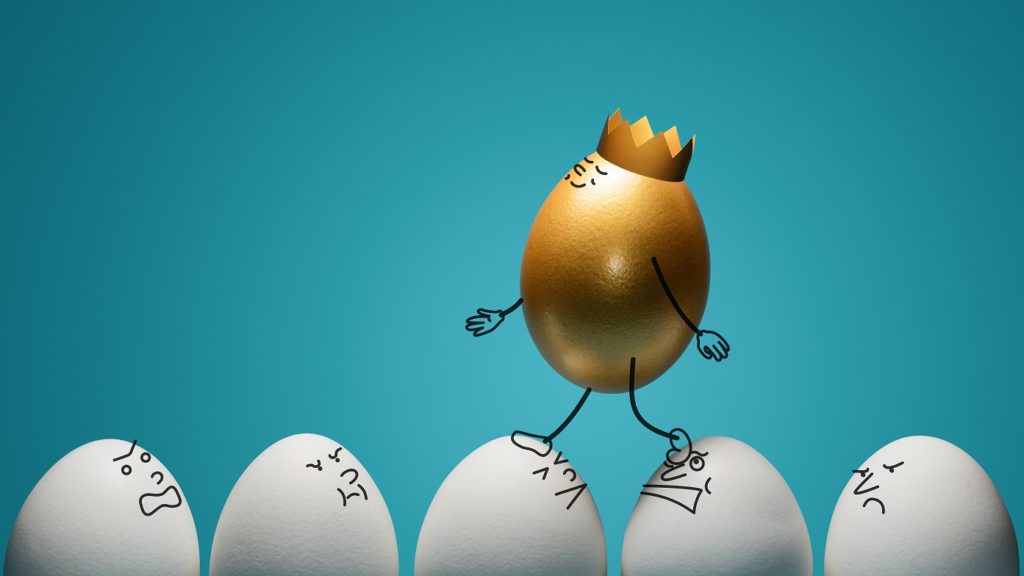Better than the rest: there’s a narcissist in all of us
What a narcissist! As with autism and borderline, we use this psychology term all the time to characterize our fellow human beings. Psychologist Stathis Grapsas obtained his PhD at Tilburg University with research on narcissism and social status. According to him, we all exhibit narcissistic behavior from time to time. But in the case of a narcissistic personality disorder there is more to it.

How to Recognize a Narcissist; Ten Signs You’re Dating a Narcissist; How to deal with a narcissist? Just three random titles of recent articles on narcissism. Narcissism is popular. “It was Trump’s behavior, among other things, that sparked the broad interest in narcissism,” Stathis Grapsas says during a video interview from his book-filled study. Both among the general public and in science.
“When Donald Trump became president and appeared frequently in the media, people wondered: why is this man acting like this? Psychologists who were asked this question quickly labeled him a ‘prototypical narcissist.'” A series of articles and videos followed explaining this further. This increased attention did not go unnoticed in academia: “There was a resurgence of interest in narcissism research,” Grapsas says.
You will not catch Grapsas (publicly) diagnosing someone as a narcissist, without first doing extensive psychological research. But he does find it valuable that people become more familiar with this theme. “Narcissism is not a disease. It is an everyday personality trait that is present in all of us to a greater or lesser degree. More knowledge about it provides insight into our own blind spots, into the sometimes-difficult interaction with others.”
Feeling better than others
According to the researcher, narcissism indicates to what extent we believe that we are great, superior, and better than others. A narcissist claims this superiority especially in areas where you can earn a lot of status and respect: being very creative or intelligent or having an attractive appearance. According to Grapsas, empathy, friendliness, or community spirit are not qualities they like to boast about.
“Moreover, that sense of exceptionality often goes hand in hand with the assumption that you have a claim to certain privileges,” Grapsas further explains. “Because you are so special, you are entitled to ‘more’.”
‘A narcissist brags about his accomplishments while a colleague has just lost her job‘
Narcissism is not just about what a person believes about themselves, it is also about behavior. “Classic behavior of narcissists is behavior that we can all exhibit when we are trying to gain respect and admiration in conspicuous ways. Sort of like peacocks do,” the researcher explains. “Bragging about who you are and what you do. Showing off what you have. And when another person is in the spotlight, tending to belittle or blacken that person in the eyes of others.”
Display of dominance and power is also prototypical narcissistic behavior. Grapsas: “being very directive and wanting to be the boss.”
The narcissist cannot handle criticism very well and they are insensitive to the emotions of others. “They think mainly of their own means and goals. For example, someone might brag about his own achievements while a colleague has just told him that she has lost her job.”
Leader or narcissist?
Apparently, there is a small or bigger narcissist hidden in all of us. Yet, an extremely high degree of narcissism can ultimately indicate a disorder: narcissistic personality disorder. “Even if people score relatively high on the scale of narcissism, there are always other characteristics that color their personality.
“In someone with narcissistic personality disorder, it is so prominent that it greatly overshadows other traits. This personality disorder is also often accompanied by expressions of hostility and degradation of others.”
Being loved
Acquiring fame, respect, and influence, in short social status, is an important motive for narcissists, Grapsas describes in his thesis. This is not surprising because having a high social status has many advantages. You find a partner more easily, you earn more, you get things done faster. People respect and admire you.

To be respected and loved: that’s what almost all of us want. Grapsas: “It sometimes happens that someone is both liked and respected. But you can’t just do what you want and always be liked at the same time.
“You have to compromise, accept that other people may be right. This is what a person who wants to be liked does. Sacrificing a little of one’s own will and power, for the sake of others.”
Narcissists are much less likely to trade their power to please another. They tend to think that what they are doing is absolutely right and that others are wrong.
Narcissism in childhood
That narcissists have a stronger need to acquire and maintain social status is also shown by an interesting experiment that Grapsas conducted during his PhD research. Simply asking whether someone finds loss of status difficult does not work with people who do not want to show their vulnerability.
That’s why he and his colleagues developed a computer game in which they let participants make political decisions. By measuring how often and when they frown and smile, participants betray more than they are willing to admit.
During the game, test subjects could choose between two options each time. For example, they were given the choice to solve a disagreement between political parties by planning a meeting or by trying to persuade dissident party members. Five choices were programmed to be successful and five were programmed to be unsuccessful.
‘Status is particularly enjoyable even in childhood and young adulthood‘
In case of success, the participants’ decision was followed by a triumphant sound. However, those who made an “unsuccessful choice” received a fictitious phone call from a superior who scolded them. Grapsas: “We found that adults with higher levels of narcissism smiled less after such a reprimand. For us, this is an indication that they don’t like losing that status.”
In another experiment, Grapsas had children participate in a Facebook-like platform. By assigning a profile a lot of popularity one time and not the next, Grapsas discovered that the children with higher narcissism levels frowned more intensely upon status loss and smiled more after status gain.
“Research shows that gaining status as early as childhood and young adulthood is particularly enjoyable for those who score higher on the narcissism scale. They like being the leader and being popular, they like directing others. With status loss, they have a much harder time dealing with it.”
The difference between self-respect and narcissism
Narcissists long for status and find it difficult when it is not granted or is lost. Again, feelings that we all experience to a greater or lesser degree, yet according to Grapsas there is an important difference.
“People often confuse narcissism with the concept of self-respect: experiencing love, appreciation, and respect for yourself. The belief that we are worthy people. Self-respect relates to a sense of status as well as a sense of belonging within the social group that we have.”
Coveting social status is not bad in itself, the researcher stresses. But it goes wrong when it is your most important goal and you do not care how you fit in or how you relate with others.
“Narcissism is not about being worthy. It’s about being the best. To be better than others and entitled to more. Knowing the distinction between this idea ’that we are worthy’ and the idea ’that we are superior’ allows us to better recognize and understand people who exhibit exploitative or highly selfish behaviors. We can ultimately use that knowledge to develop successful interventions and treatment methods.”






